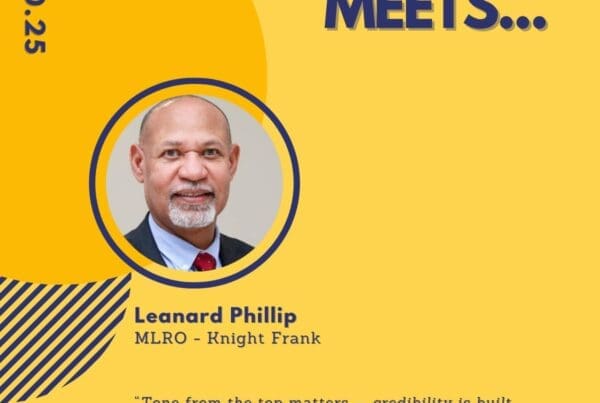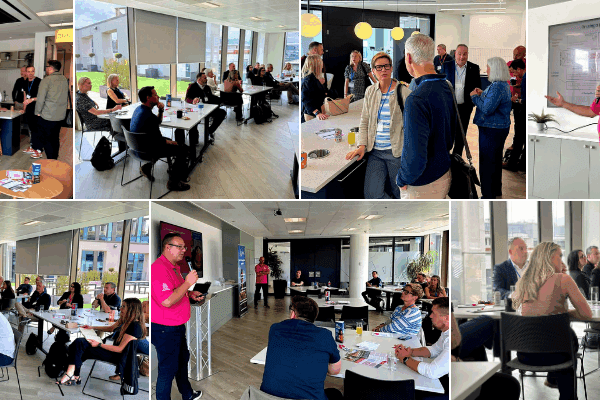Over the years, our MERJE Meets series has seen us chat to Chief Operating Officers, Co-Founders, Chief Executive Officers, and more.
The series focuses on delving into the working lives and careers of senior industry professionals across our core specialisms, such as Legal, Compliance, Analytics, and Finance.
Here, we’ve compiled some of the most insightful answers from three of the senior Risk Management professionals we spoke to:
-
Briony Horvath – Chief Risk Officer, The AA
-
Chris Blampey – Head of Risk Strategy, Chetwood Financial
-
Tom Sleight – Chief Risk Officer, Link Scheme
The UK is seeing an increasing number of FinTech businesses coming to market, how do you see this impacting the industry overall?
[Chris]
If you take retail banking as an example, the barriers to entry were historically so high that the established high street banks were left unfettered and unchallenged. This all changed following the simplification of the authorisation process and you’re now seeing a range of different business models and approaches.
Crucially, fintech is opening up the value chain, so that you no longer have vertically integrated entities competing in every market. So, for example, Chetwood was able to launch with a single product, distributing through ClearScore and leveraging third party payment providers to move the money around.
What’s really exciting is you now have an ecosystem of partners; product providers, distribution partners, payment services and data and analytics specialists all working together to drive real innovation and competition. Inevitably some of these will fail, but others will establish themselves as long term alternatives to the traditional players.
What type of qualities or attributes do you look for when building out your team?
[Briony]
My roles often involve some sort of transformation and The AA is no different. Therefore, I am attracted to a diverse range of people who can bring something new to the table to help move things forward.
I like working with people who are not afraid to challenge the status quo, genuinely want to work as part of a high performing team and who are up for a bit of a laugh as well.
What advice would you give to rising talent in your industry?
[Chris]
I’d encourage them to move around, either within an organisation or between different companies. Before I worked in banking, I spent seven years in consulting across utilities, transport, telcos and pharmaceuticals. I think a lot of the best ideas come about by taking something that works well in one sector and applying it to another.
[Briony]
Take every opportunity you can to learn skills outside of risk and compliance, especially around business and strategy. To be effective in your role you really need to fully understand a business from a practical rather than theoretical level. Learn how to code, take courses in business strategy and broaden your skill-set outside of the risk and compliance box.
[Tom]
Try to speak to people in a language they understand. In other words, avoid jargon. To many people, Risk is either seen as an impenetrable dark art or as a means of preventing a business doing what it wants to do. In my experience, people are generally surprised that Risk can be an enabler. Few senior Risk people I have met started out their careers with aspirations of becoming a professional in this arena. Many of them started in the business and progressed through a number of different roles.
More recently, I see rising talent taking courses in Risk Management and therefore arriving steeped in theoretical expertise but with less hands on experience of how businesses operate in practice. I would therefore encourage anyone starting their career to get as close to the first line as they can, while maintaining their independence. In my experience, the better you understand the day-to-day pressures in the first line, the more chance you have of providing appropriate and useful solutions.
Increasingly, there is talk of the UK moving to a cashless society and this seems to be in the spotlight after COVID-19. What are your thoughts on this and its potential impact on society and how do you see LINK reacting to this potential change?
[Tom]
Cash usage has dropped for a number of years now and LINK’s role remains to manage that orderly decline. The impact of COVID-19 has been to accelerate that reduction and while we are currently seeing ATM transactions slowly increase as lockdown restrictions are eased, we do not expect volumes to recover to their pre-COVID levels.
As we manage the decline, our focus is on maintaining the current geographic spread of ATMs. While we expect overall numbers of ATMs to fall as demand for cash does, we are aware that, for millions of people, cash remains a vital source of payment. Our role is therefore to ensure that access to cash remains available for all those who want and need it. In July 2018, LINK commissioned a leading independent study into “Access to Cash”. The results of that report were published in March 2019, noting that millions of people rely on cash and that if we sleepwalk into a cashless society, we risk leaving those people, many of whom are vulnerable, behind. This remains the case today and while the pace of change has increased, the fundamental challenge remains the same.
What do you consider to be the top three challenges in your specialism as a CRO today?
[Tom]
Certainly the pace of regulatory change and the resulting increased cost of Compliance is always a challenge. The next immediate challenge is how to safely and securely manage our return to the workplace as lockdown restrictions continue to ease. Finally, on a longer-term basis, is the challenge of addressing the strategic impact of the pandemic while maintaining a sharp focus on our other risks, none of which have gone away.
If you could go back in time, what advice would you give to your former self?
[Briony]
Don’t equate the success of others with you being a failure. Everyone has their own journey to go on. Just keep your eye on what you want to achieve and work towards your own goal.
[Tom]
Never put off delivering bad news or starting an unpleasant or difficult task.
[Chris]
Focus on the things you can influence and make the most of every opportunity.
Read the full Q&As here:
If you would like to collaborate with us on an article, Q&A, or insight piece, please get in touch: marketing@merje.com







